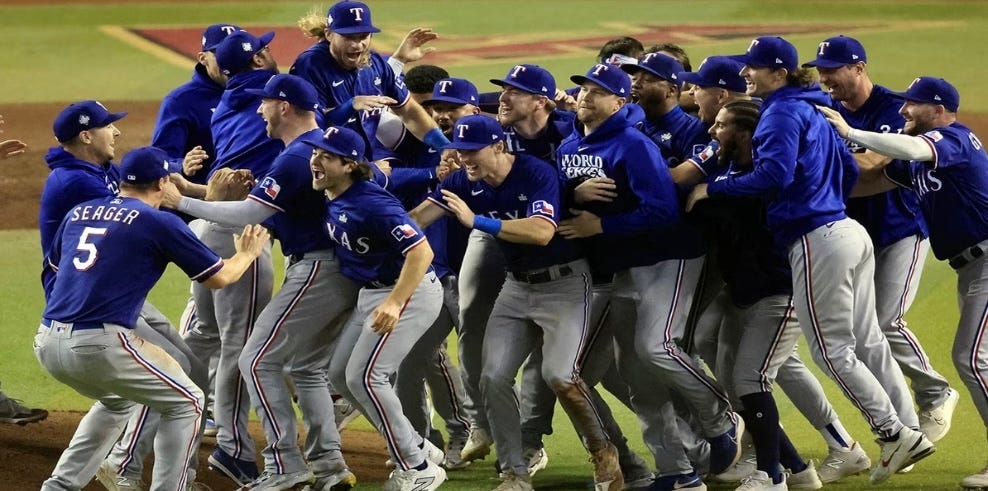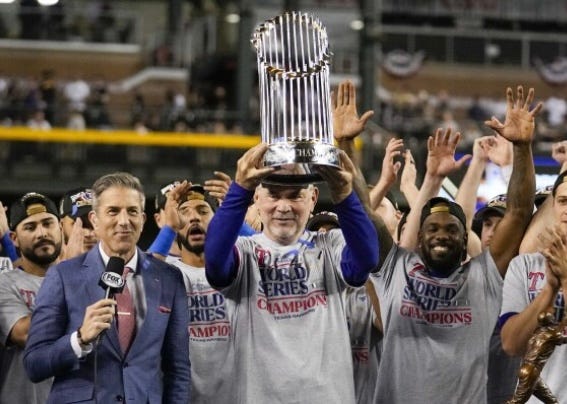Bang for their buck
In a season in which several big spenders floundered, the Texas Rangers invested wisely and are the last team standing

Among the prevailing storylines that dominated the 2023 major league season were the shocking meltdowns of the Sport’s 3 biggest spenders.
The Mets, Yankees and Padres combined to spend more than $850 million on their Opening Day payrolls (before luxury tax), but those 3 clubs finished the year a combined 66 games out of first place, with the Yanks and Padres winning 82 games each while the Mets won a mere 75.
But then there are the Texas Rangers.
The newly crowned World Series champions, who ended the year with the 4th-highest payroll in the majors according to Sportrac, serve as a reminder that spending wisely can pay huge dividends.
After recording 6 straight losing seasons and the 3rd-worst overall record in the major leagues over the last 3 seasons (ahead of only the Nationals and Pirates), the Rangers today are preparing for a championship parade for the first time in franchise history.
After 102 losses in 2021, owner Ray Davis opened his checkbook for General Manager Chris Young, and the Rangers made a pair of splashy signings: free agent shortstop Corey Seager to a 10-year, $325 million contract and second baseman Marcus Semien for 7 years and $175 million.
The 2 Scott Boras clients paid immediate dividends with their on-field production and clubhouse leadership in 2022, setting the stage for the Rangers to spend heavily on pitching in 2023.
Acquired this past winter, Jacob deGrom (5 years, $185 million), Nathan Eovaldi (2 years, $34 million) and Andrew Heaney (2 years, $25 million) brought the 2-year spending spree to $744 million.
Jon Gray has made 53 starts (and one huge World Series relief appearance) for the Rangers over the last 2 seasons after signing prior to 2022. His 4-year, $56 million contract brings the Rangers’ total commitment to 6 players over the last 2 offseasons to $800 million.
And while deGrom was limited to only 6 starts due to injury in 2023 and missed the entire postseason, it’s hard to overstate the impact made by the other newcomers, particularly Seager, Semien and Eovaldi.
Seager, the World Series MVP, has been an All-Star in both seasons in Texas and will likely finish 2nd to Shohei Ohtani in AL MVP voting. He’s posted consecutive 33 homer campaigns and, this year, batted .327/.390/.623/1.013 with a league-high 42 doubles, 33 long balls and 96 RBI.
He saved his best for October, batting .318/.451/.682/1.133 with 6 doubles, 6 homers and 12 RBI in 17 post-season games.
The Rangers shortstop went 5-for-8 with 3 doubles and 2 RBI in the 2-game Wild Card series sweep of the Rays. He was 2-for-6 with a home run and 9 walks in Texas’ 3-game NLDS sweep of the top-seeded 101-win Orioles. He had 8 hits, 4 for extra bases, including 2 home runs, in the ALCS against the Astros, including a 3-hit game with a double and a homer in the decisive Game 7. And he homered 3 times and knocked in 6 in the 5-game World Series, setting the tone for the Rangers series win with a game-tying 2-run homer in the bottom of the 9th in Game 1.
Semien has played in every game but one in 2 seasons as a Ranger, including all 179 regular and post-season games this year. On his way to an All-Star selection in 2023, he led the AL in hits and runs scored, while banging 40 doubles, 4 triples and 29 homers and knocking in 100.
He hit safely in his final 7 post-season games against the Astros and D-Backs, homering twice and knocking in 7 runs in the last 2 games of the World Series.
Eovaldi was an All-Star on his first season with the Rangers, finishing 12-5 with a 3.63 ERA in 25 starts. But the native Texan saved his best for October, going 5-0 with a 2.95 ERA in 6 starts, striking out 41 in 36 2/3 innings. He became the 4th pitcher (the 3rd starter) to win 5 games in a single postseason, joining Randy Johnson with the 2001 D-Backs, reliever Francisco Rodriguez with the 2002 Angels and Stephen Strasburg with the 2019 Nationals.
The winning pitcher in last night’s series clincher with 6 scoreless innings to outduel fellow former Marlin Zac Gallen, Eovaldi went at least 6 innings in 5 of his 6 October starts—and pitched into the 7th 3 times—a staggering accomplishment when you look at how starting pitchers are handled in the postseason in this era.
So while there may be an abundance of buyer’s remorse in several big league front offices these days, in Texas there’s a parade on tap to celebrate a championship that was well-earned and nearly a billion dollars that were well-spent.
More on the World Series…
With Texas capturing the World Series, MLB has had 9 different champions in the last 10 seasons. No team has repeated since the Yankees won 3 in a row from 1998-2000.
As Chris Vannini of The Athletic pointed out, we are in a golden era of championship parity across the sporting landscape.
The NFL has had 5 different champions in the last 6 years (the Eagles, Patriots, Chiefs twice, Buccaneers and Rams).
The NBA has seen 5 different champs in the last 5 years (the Raptors, Lakers, Bucks, Warriors and Nuggets).
The NHL has had 6 in the last 7 seasons (the Penguins, Capitals, Blues, Lightning twice, Avalanche and Golden Knights).
College Football has had 4 different champs in the last 5 years (Clemson, LSU, Alabama and Georgia twice).
Men’s College Basketball has seen 7 different schools prevail in the last 8 NCAA Tournaments (Duke, Villanova twice, North Carolina, Virginia, Baylor, Kansas and UConn).
On the women’s side, there have been 5 different title winners in the last 5 Tournaments (Notre Dame, Baylor, Stanford, South Carolina and LSU).

With his 4th World Series title as a manager, Bruce Bochy is now tied with Walter Alston and Joe Torre for 4th place on the all-time list trailing only Joe McCarthy (7), Casey Stengel (7) and Connie Mack (5).
They like to say that the postseason is a crapshoot, but Bruce Bochy is 15-1 in his last 16 post-season series. And his Giants and Rangers were underdogs in well over half (and arguably about 3/4) of those 16 series.
The last 3 World Series-winning managers are Bruce Bochy (68-years-old), Dusty Baker (73 when he won with the Astros in 2022) and Brian Snitker (66 when he guided the Braves to the title in 2021).
No matter what some may want you to believe, there is something to be said for experience, wisdom and strength; the ability to command a clubhouse; and the confidence to factor in all of the information that’s now available to managers but still make a thoughtful decision from the gut that, heaven forbid, might go against the book.
Rangers shortstop Corey Seager became the 4th player to win 2 World Series MVP awards, joining Hall of Famers Sandy Koufax (1963 and 1965 with the Dodgers), Bob Gibson (1964 and 1967 with the Cardinals) and Reggie Jackson (1973 with the Athletics and 1977 with the Yankees). Seager, who was previously the MVP of the 2020 Fall Classic as a Dodger, joins Jackson are the only players to win the honor with 2 different clubs.
With the Rangers (born as the Washington Senators in 1961 before moving to Texas in 1972) winning their first championship, the Minnesota Vikings (1961) are now the oldest franchise in the major North American professional leagues to never win a title.
While you’re here…
Your feedback is always appreciated. Hit the “LIKE” button below if you enjoyed this post.
Interested in advertising on VIEW FROM THE BLEACHERS? Contact me here to learn about opportunities to promote your business on a daily or weekly basis.
Learn more about one-on-one play-by-play coaching from Glenn Geffner via Zoom at glenngeffner.com.




What I find most interesting is not the randomness of a high-spending team winning a title, but if that win alone constitutes success? Are the latest era Phillies "successful?" Is reaching the WS or simply running deep into the playoffs regularly successful? The Braves? Are the Braves successful for one title in the 1990s or disappointing? If they don't win another title in ten years will be still praise their "progressive" player contract strategy? The Dodgers, with their 2020 fishbowl "championship" and $2b in the Roberts era? Financially, yes, I presume for all of the aforementioned teams. Baseball on-field success is hopelessly random, it seems. Since the Rangers won, baseball genuflects to their "formula" knowing full well nobody really knows. Which, of course, keeps us interested, I suppose.